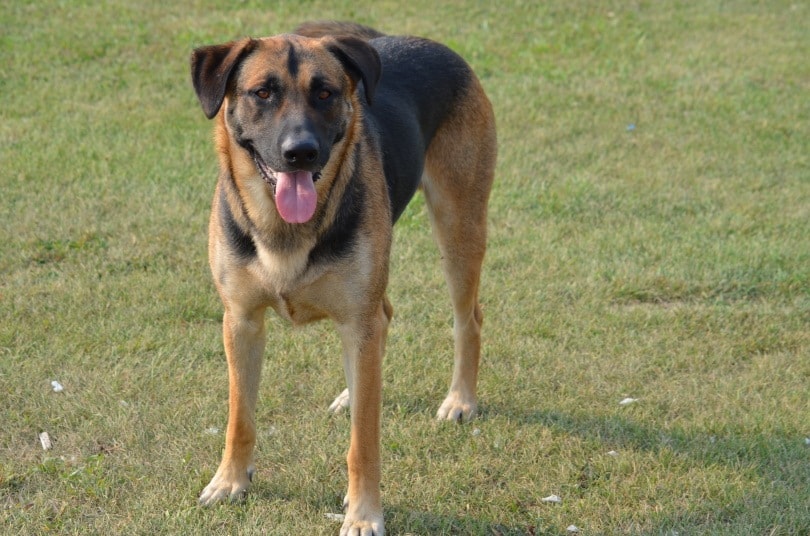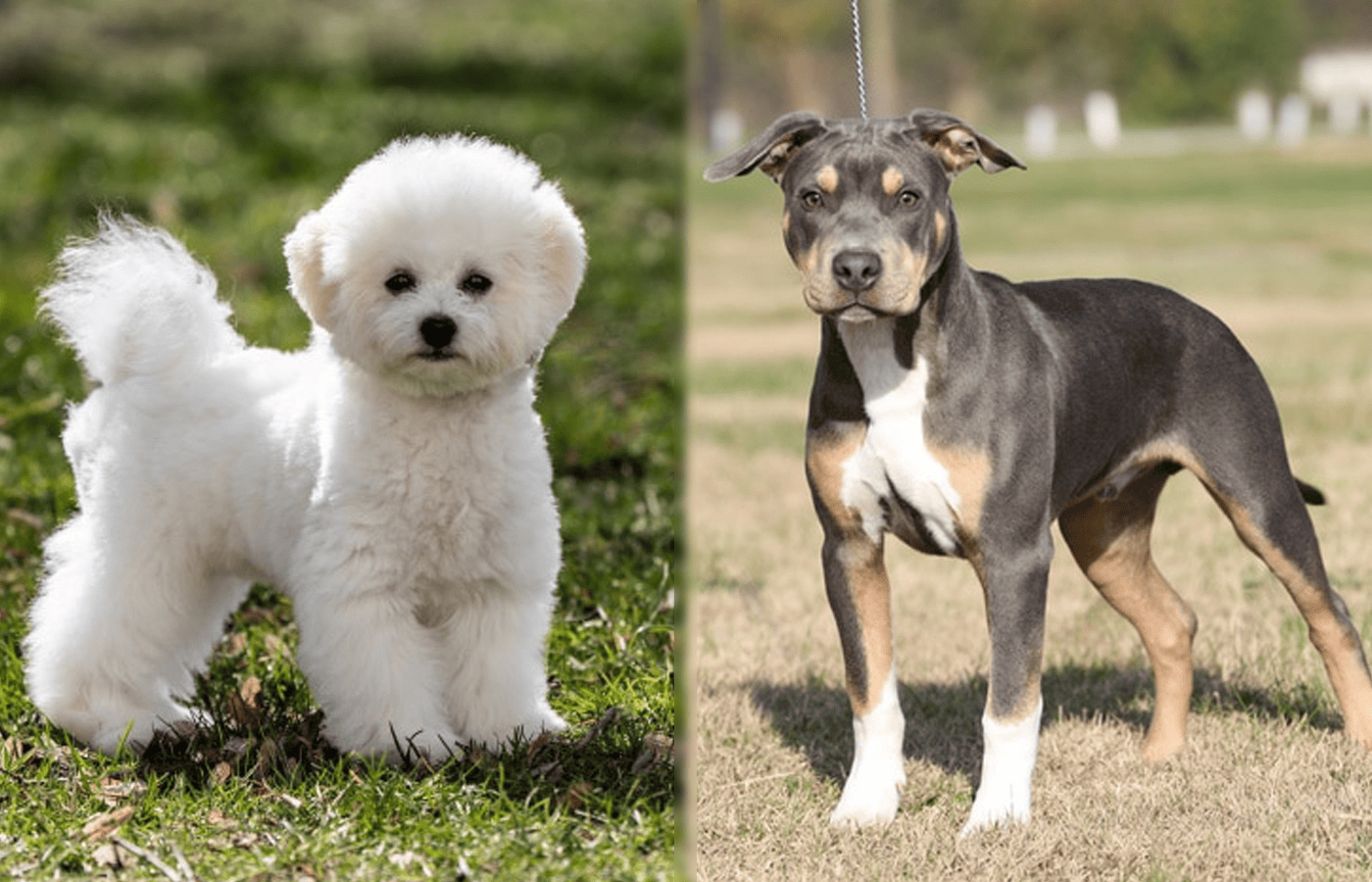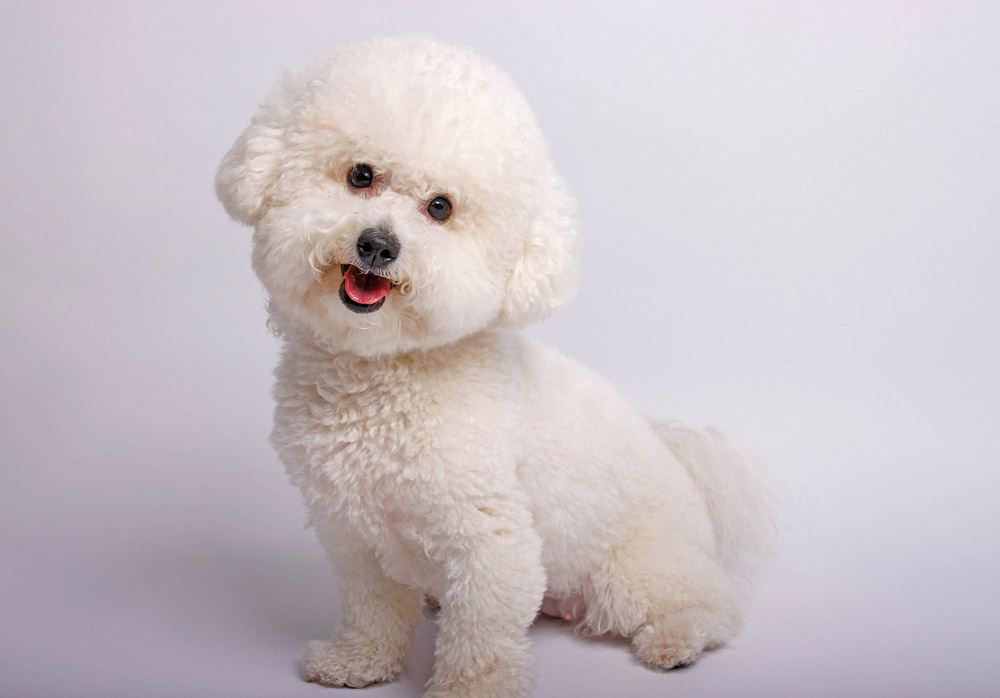Click Below to Skip Ahead
Two of the most recognized dogs in North America are Labrador Retrievers and German Shepherds. In fact, according to the AKC, the Lab is the second-most popular breed, and the German Shepherd follows close behind.1 So, it seems only natural to combine these dogs to get one of the best hybrids ever. This brings us to the German Shepherd Lab Mix, also known as the German Sheprador and the Labrashepherd.
Breed Overview
Height:
20–27 inches
Weight:
60–95 pounds
Lifespan:
10–12 years
Colors:
Cream, brown, white, gray, black, red
Suitable for:
Active families, house with a yard
Temperament:
Affectionate, protective, loyal, intelligent, energetic
These dogs typically take on both of their parents’ appearances. They have double coats that are coarse and straight, and they usually have triangular, floppy ears. They can have brown, black, gray, cream, white, and reddish-brown coats, which can be solid or a combination of colors.
German Shepherd Lab Mix Puppies

The German Shepherd Lab Mix puppy is an energetic, robust, healthy breed. They have the typical lifespan for a dog of this size and are usually quite easy to train. While they are protective of their families, they are also friendly and social. The puppies are typically energetic and playful, making them great family pets. They also tend to be good with children and are known for their friendly and affectionate personalities.
These dogs require plenty of physical and mental stimulation and are well-suited for an active lifestyle. They have a high exercise and playtime requirement, so it is important for potential owners to be able to provide them with plenty of opportunities for physical activity. Overall, German Shepherd Lab Mix puppies are a great choice for families or individuals who are looking for friendly and active companions.
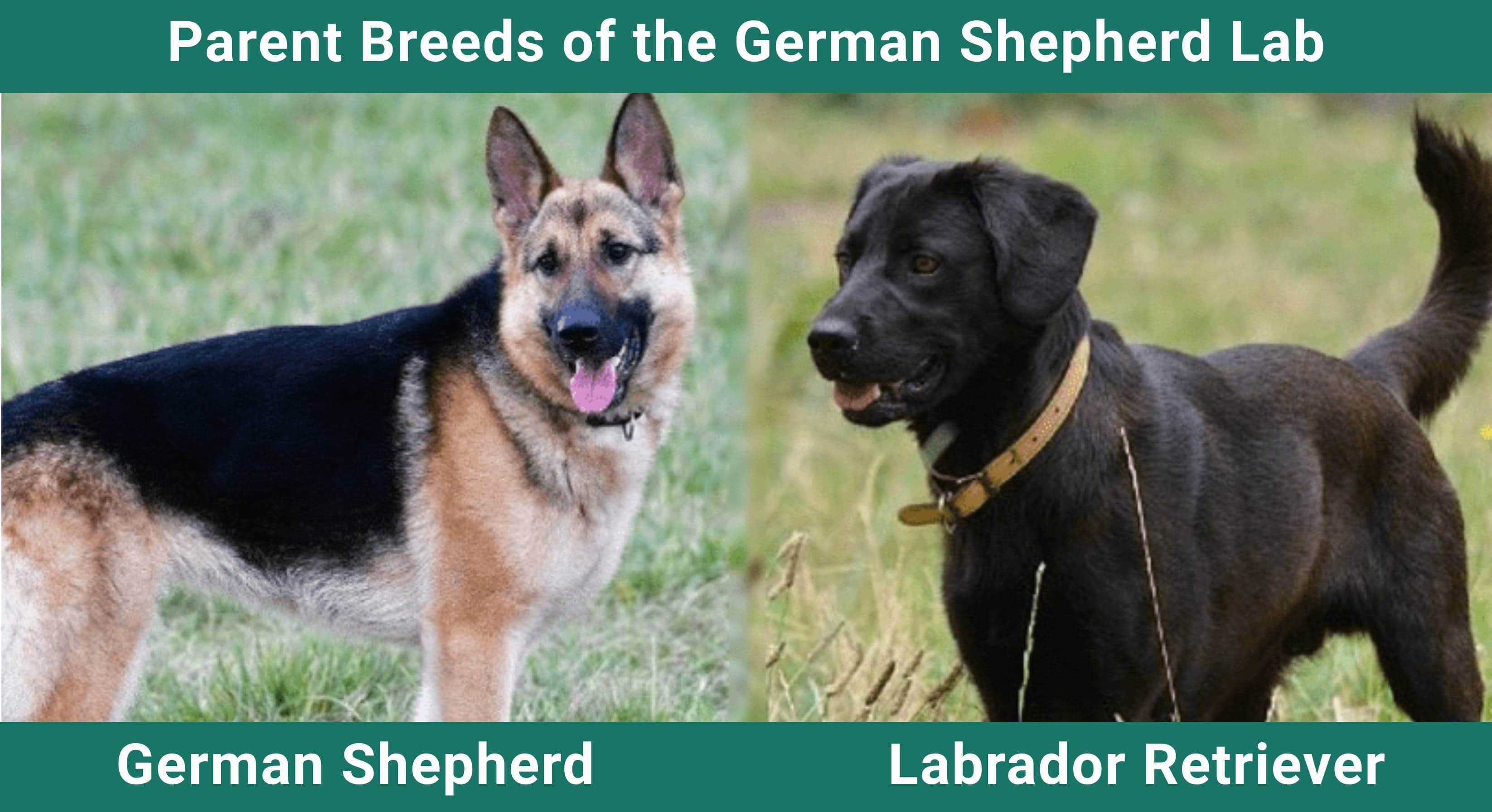
Temperament & Intelligence of the German Shepherd Lab Mix 🧠
It does help to understand the temperament of the parent breeds to gain some insight into what kind of personality the German Shepherd Lab might have. German Shepherds are devoted, loving, and protective dogs famous for being great family pets and for their work as police and guard dogs. Labrador Retrievers are renowned for their sweet and lovable natures and for being friendly and energetic.
Both breeds are also intelligent dogs, so you can expect the German Shepherd Lab to be smart, sweet, affectionate, and devoted.
Are These Dogs Good for Families? 👪
Absolutely! Both the Lab and the German Shepherd make great family pets, so you can expect the same with the German Shepherd Lab. They are famously wonderful with children, and their high energy levels make them great playmates.
However, just remember to always supervise your young children when they are around the dog. Ensure that you have taught your kids to respect dogs. There should be no tail pulling, no ear tugging, and no bothering them while they eat.

Does This Breed Get Along With Other Pets? 🐶 😽
As a general rule, the German Shepherd Lab does get along well with other family pets. While some of this comes from their sweet temperaments, it’s also vital that they are socialized at a young age and introduced to other dogs and smaller pets. They typically enjoy a good romp with other dogs at the park.
Things to Know When Owning a German Shepherd Lab Mix
Food & Diet Requirements 🦴
Always find the best dog food for your German Shepherd Lab designed for their current age, size, and activity level. These are large dogs with high energy, so look for the appropriate food. You can also follow the recommendations on the back of the dog food bag to help you figure out how much your pup needs to be fed daily.
Too much food and treats can lead to obesity with the German Shepherd Lab, so watch what you feed them, and try to stay away from too much people food. Speak to your vet about your pup’s weight and health if you’re ever concerned.
Exercise 🐕
These dogs have a ton of energy, so expect to get at least a 1-hour walk in every day, with a few extra shorter walks. Don’t forget playtime! Throw that ball around, and the Retriever in your hybrid will be happy. Due to their size and energy, they are best suited for a house with a yard.
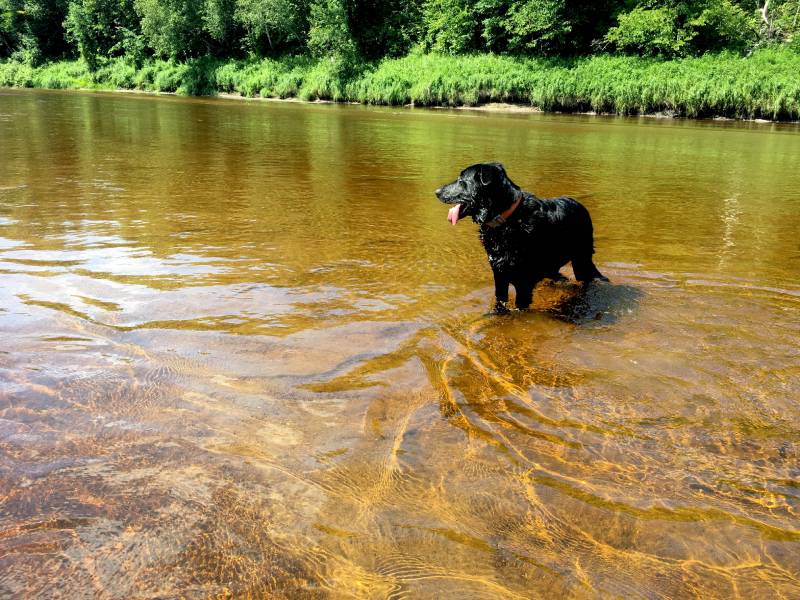
Training 🎾
For the most part, the German Shepherd Lab is quite trainable. However, they are best suited for experienced dog owners. They thrive on positive reinforcement, so along with their intelligence and devotion to their owner, training shouldn’t be too much of a challenge.
Grooming ✂️
Both the Lab and the German Shepherd have double coats with short, straight fur (unless the German Shepherd parent happens to be the long-haired variety). Brushing is easy, but they could use brushing several times a week because of their shedding. This will need to be done daily during the shedding seasons. Give your German Shepherd Lab a bath only when absolutely necessary, using a good dog shampoo.
You should clean your German Shepherd Lab’s ears about once a week and brush their teeth and trim their nails two or three times per week.
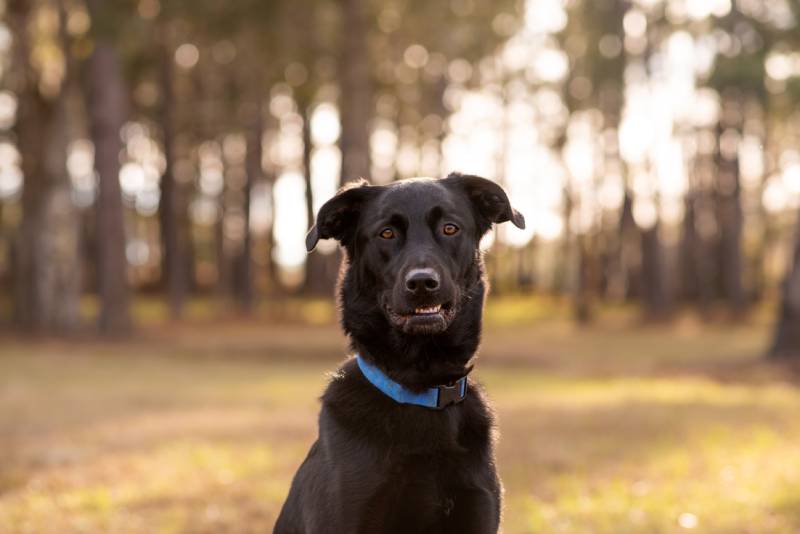
Health and Conditions ✂️
The German Shepherd Lab should not be as predisposed to the health issues that their purebred parents are. However, it is still a good idea to be aware of some of the genetic conditions that the German Shepherd Lab’s parents are prone to.
The German Shepherd is susceptible to the following:
- Hot spots
- Skin allergies
- Corneal inflammation
- Cataracts
- Elbow dysplasia
- Heart disease
- Hip dysplasia
- Cancer of the blood cells
- Von Willebrand’s disease
- Bone inflammation
- Spinal cord disease
- Mouth cancer
- Narrowing of the vertebral canal
- Gastric torsion
- Fatal fungal infection
- Perianal fistula
The vet will check your pup’s eyes, skin, and thyroid to help rule out any of these health conditions.
The Labrador Retriever might suffer from the following:
- Collapse during exercise
- Eyelash disorders
- Abnormal eyelid
- Degeneration of the image forming part of the eye
- Eye defects
- Hot spots
- Hypothyroidism
- Cataracts
- Hip dysplasia
- Elbow dysplasia
- Muscular dystrophy
- Diabetes
- Heart valve malformation
The vet will check the German Shepherd Lab’s hips and elbows and will run a complete battery of tests, including blood and urinalysis exams.
Male vs. Female
The German Shepherd Lab tends to be 20 to 27 inches in height. The females weigh an average of 75 to 85 pounds and the males 85 to 95 pounds. So, as a general rule, female dogs tend to be a little smaller and weigh less than males.
Getting a male dog neutered is an easier and less complicated surgery than spaying a female, which means it’s less expensive, and he’ll recover quickly. Regardless of sex, this is an important procedure for your pup, as it not only prevents unwanted pregnancies but also ensures that your German Shepherd Lab will live a longer life.
Finally, there is a belief that male and female dogs have different personalities, but this isn’t always true. How a dog is trained, raised, and socialized will have the most significant impact on their temperament.
3 Little-Known Facts About the German Shepherd Lab Mix
1. The German Shepherd Lab doesn’t enjoy hot weather.
Their thick double coats enable them to deal with cold weather, but they won’t be as comfortable when the temperature soars.
2. The German Shepherd Lab might chew your shoes.
This pup tends to enjoy chewing on everything they can get their teeth on. So, be prepared to hide your prized possessions (especially your shoes), and invest in appealing chew toys.
3. The German Shepherd Lab will make a great guard dog for the family.
The protective nature of the German Shepherd parent can make the German Shepherd Lab a fantastic watchdog for your family. While they can be protective and territorial at home, they are social and friendly dogs due to their Lab parent.
Summary
If you’ve decided that you would like to bring a German Shepherd Lab Mix into your home, you could start by speaking to the breeders of Labrador Retrievers and German Shepherds. Looking online and posting your search on social media is another method you can use that would probably prove quite helpful.
Lastly, you can contact the Designer Breed Registry and the International Designer Canine Registry, as the German Sheprador is a registered hybrid dog through these organizations. Don’t forget to follow these tips when you do find a breeder. Also, don’t forget to look into adopting a rescue dog.
You’ll get the best of both worlds with the German Shepherd Lab. They’re sweet and loyal, proud and loving, and the best companion you might ever have.
Looking for other crossbreeds? There are multiple articles for both German Shepherds and Labrador Retrievers!
- See also: German Shepherd Jindo Mix
Featured Image Credit: Darling21, Shutterstock

